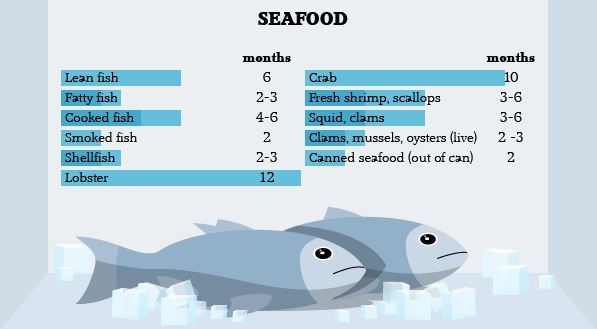The freshness of fish can vary depending on the type of fish, how it was handled, and the storage conditions. In general, fresh fish can last in the refrigerator for 1-2 days. However, it is always recommended to consume fish as soon as possible to ensure its optimal quality and minimize the risk of foodborne illness.
Know More About: how long does fresh fish last in the fridge
Fresh fish is a delectable delight for seafood enthusiasts. Its succulent texture and delicate flavor make it a versatile ingredient in various culinary preparations. But as with any perishable food item, it is essential to understand how long fresh fish can last in the fridge before it loses its quality, taste, and potential health benefits. In this article, we will explore the various factors that affect the shelf life of fresh fish and offer some tips to maximize its freshness.
The duration for which fresh fish remains safe to consume depends on multiple factors, such as the type of fish, its initial quality, and how it is stored. Generally, fresh fish can be refrigerated for up to two days before it starts losing its freshness. This timeline applies to most common fish varieties, including salmon, trout, cod, and tilapia. However, more delicate fish, like sole or flounder, might have a shorter shelf life of only a day or two.
Proper storage techniques play a vital role in prolonging the shelf life of fresh fish. Thoughtful handling and storage can help preserve its taste and texture. Upon purchase, it is important to immediately put your fresh fish on ice or in the refrigerator to prevent bacterial growth and keep it at a safe temperature. You should also ensure that the fish is wrapped tightly in moisture-resistant packaging or place it in an airtight container to avoid exposing it to air and moisture, which can accelerate spoilage.
Another crucial aspect to consider is the storage temperature of your refrigerator. The optimal temperature for storing fresh fish is between 32 to 38 degrees Fahrenheit (0 to 3 degrees Celsius). By maintaining a constant and appropriately low temperature, you can slow down the growth of bacteria, extending the fish’s freshness. It is advisable to regularly monitor your refrigerator’s temperature to ensure it remains within the safe range.
While it is ideal to consume fresh fish within two days of purchase, freezing can significantly extend its shelf life. Freezing fresh fish can preserve its quality for several months, allowing you to enjoy it even after an extended period. However, it is important to properly prepare the fish for freezing to prevent freezer burn and maintain its taste. Thoroughly rinse and pat dry the fish, then wrap it tightly in plastic wrap or place it in a freezer bag, ensuring all excess air is squeezed out. Properly labeled and dated, the fish can be stored in the freezer for up to six months without significant loss of quality.
Despite all precautions, it is crucial to remember that consuming spoiled fish can pose health risks. Signs of spoiled fish include a fishy or ammonia-like odor, slimy texture, or discoloration. If you notice any of these signs, it is best to discard the fish to avoid potential foodborne illnesses.
In conclusion, fresh fish can last in the fridge for about two days if stored and handled properly. By ensuring the fish is kept at the right temperature and using appropriate packaging, you can maximize its freshness. Freezing fresh fish can extend its shelf life for several months, allowing you to enjoy it beyond the initial purchase date. However, always rely on your senses and discard any fish that shows signs of spoilage. So, the next time you bring home some fresh fish, remember these guidelines to make the most of this delectable ingredient.
FAQs on how long does fresh fish last in the fridge
1. How long does fresh fish last in the fridge?
Fresh fish typically lasts about 1 to 2 days in the fridge.
2. Can I extend the shelf life of fresh fish in the fridge?
Yes, you can extend its shelf life by storing it properly. Consider keeping it in an airtight container or wrapping it tightly in plastic wrap to reduce air exposure.
3. Is it safe to eat fish that has been in the fridge for a week?
It is not recommended to consume fish that has been stored in the fridge for a week. It is advisable to consume it within the first couple of days for optimal freshness and taste.
4. How can I tell if fresh fish has gone bad?
Some signs of fish being spoiled include a strong, unpleasant odor, slimy texture, or discoloration. If you notice any of these, it’s best to discard the fish.
5. Can I freeze fresh fish to prolong its shelf life?
Yes, you can freeze fresh fish to extend its shelf life. Make sure to wrap it tightly in freezer-safe packaging and label it with the date to ensure proper storage.
6. How long can fresh fish last in the freezer?
When properly stored in the freezer, fresh fish can last up to 3 to 6 months.
7. Does the type of fish affect its fridge life?
Yes, the type of fish can impact its shelf life. Fatty fish like salmon or mackerel tend to spoil faster than lean fish like cod or haddock.
8. Are there any specific storage tips for fresh fish?
Yes, it’s advisable to store fresh fish on a bed of ice in the fridge to maintain its temperature and freshness. Make sure to drain any excess water from the ice as it melts.
9. What’s the best way to use leftover fresh fish?
If you have leftover fresh fish, it’s best to consume it within 1-2 days. Use it in salads, sandwiches, or heated dishes like fish chowder or stir-fry.
10. Can I eat fresh fish that smells slightly fishy?
Fresh fish should not have a strong fishy odor. If the smell is only mildly fishy, it is likely still safe to eat. However, it’s always better to trust your nose and discard it if the smell is unpleasant.

